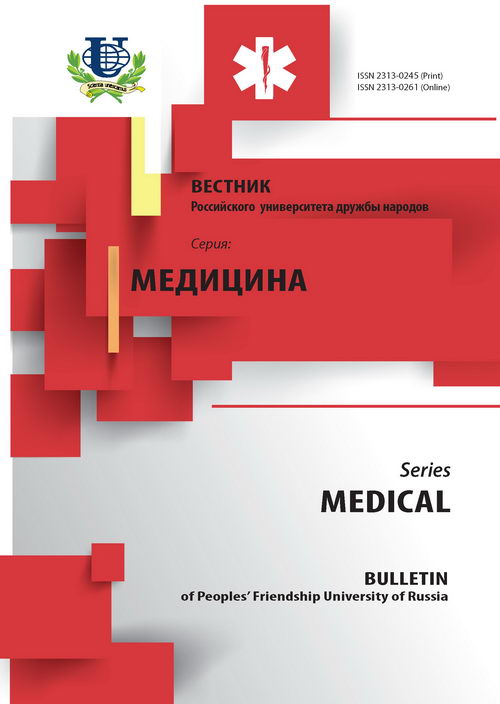Новые пути решения проблемы бесплодия в старшем репродуктивном возрасте
- Авторы: Ермоленко К.С.1, Гагаев Ч.Г.1, Соловьева А.В.1, Рапопорт С.И.2
-
Учреждения:
- Российский университет дружбы народов
- Первый московский государственный медицинский университет имени И.М. Сеченова
- Выпуск: № S5 (2013)
- Страницы: 130-136
- Раздел: Статьи
- URL: https://journals.rudn.ru/medicine/article/view/3441
- ID: 3441
Цитировать
Полный текст
Аннотация
Ключевые слова
Об авторах
Кристина Станиславовна Ермоленко
Российский университет дружбы народов
Email: Z.kristinaST@yandex.ru
Кафедра акушерства и гинекологии с курсом перинатологии
Челеби Гасанович Гагаев
Российский университет дружбы народов
Email: Z.kristinaST@yandex.ru
Кафедра акушерства и гинекологии с курсом перинатологии
Алина Викторовна Соловьева
Российский университет дружбы народов
Email: av_soloveva@mail.ru
Кафедра акушерства и гинекологии с курсом перинатологии
Семен Исаакович Рапопорт
Первый московский государственный медицинский университет имени И.М. СеченоваЛаборатория «Хрономедицина и новые технологии в клинике внутренних болезней»
Список литературы
- Amirova A.A., Nazarenko T.A., Mishiev N.G. Factors influencing the outcomes of IVF (review of literature) problems of reproduction. 2010; P. 68—74.
- Anisimov V.N., Vinogradova I.A. Ageing of the female reproductive system and melatonin. — St. Petersburg: Systema, 2008.
- Cheng E.Y., Hunt P.A., Naluai-Cecchini T.A. et al. Meiotic recombination in human oocytes. PLoS Genet. 2009 Sep;5(9): e1000661.
- Daniel H., Mendez Lozano et al. Management of women with poor ovarian response to Superovulation stimulation through art programmes. Problems of reproduction. 2008; 1: P. 37—41.
- Ermolenko K.S., Bondarenko, K.V., Gagaev Ch.G., Kolesnikov D.B., Solovyeva A.V. Effectiveness of IVF women older reproductive age // Bulletin of Peoples’ Friendship University of Russia. Series “Medicine. Obstetrics and Gynecology”. — 2012. — № 5. — P. 13—17.
- Gafarova E.A., Maltseva L.I. The role of melatonin in women of menopausal syndrome and the possibility of the use of melatonin in the treatment of pathological symptoms of menopause. BREAST man and Medicine. — 2005. — Vol. 13, № 7.
- Hassold T., Hunt P. Maternal age and chromosomally abnormal pregnancies: what we know and what we wish we knew // Curr Opin Pediatr. — 2009. — Dec; 21(6). — P. 703—8.
- Hiroshi Tamura, Akihisa Takasaki et al. The role of melatonin as an antioxidant in the follicle // J Ovarian Res. 2012; 5: 5.
- Mishneva N.G. Infertility in women reproductive age: principles of diagnosis and treatment on ovarian reserve. — Moscow, 2008.
- Obstetrics: national leadership. Quick Start Guide / ed. A.C. Ajlamazian, V.N. Serov, V.E. Radzinsky, G.M. Savelyeva. — М.: GEOTAR-media, 2012.
- Oosthuizen G.M. A role for melatonin in breast disease and the menopause / G.M. Oosthuizen, G. Joubert, R.S. du Toit // S. Afr. Med. J. — 2001. — Vol. 91. — N 7. — Р. 576—577.
- Radzinskiy V.E., Ordianc I.M., Orazmuradov A.A. Women's consultation — 3-ed. — М.: GEOTAR-media, 2009.
- Reproductive health: Stud. posob / Ed. V.E. Radzinsky. — М.: RUDN, 2011.
- Rohr U.D. Melatonin deficiencies in women / U.D. Rohr, J. Herold // Maturitas. — 2002. — Suppl. 1. — Vol. 15. — N 41. — Р. 85—104.
- Shuliak I.Yu., Kurilo L.F., Adamyan l.V. etc. The follicular system // Problems of reproduction. — 2008. — Vol. 1. — P. 173—77.
- Tamura H., Takasaki A., Miwa I., Taniguchi K., Maekawa R. et al. Oxidative stress impairs oocyte quality and melatonin protects oocytes from free radical damage and improves fertilization rate // J Pineal Res. — 2008. — 44. — P. 280—287.
Дополнительные файлы















